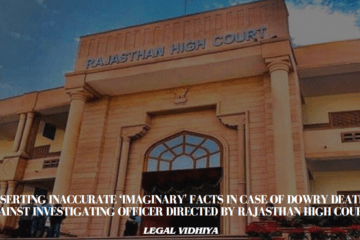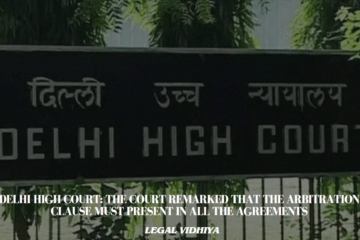
In a recent ruling, a single-judge bench comprising of Justice Gurpal Singh Ahluwalia of Madhya Pradesh High Court concluded that marriage on false information of educational qualification cannot be considered as cheating and neither be a ground for divorce.
The background of the case is as follows:
The petitioners contend that the respondent, or wife, is the spouse of the petitioner, or husband. The petitioner was informed at the time of marriage that the respondent had passed the Class 12th examination, but he later discovered that she had only passed the Class 10th. As a result, the petitioner filed complaints on various forums, claiming that he was the victim of fraud when he got married, and he sought to have the offence registered under Section 420 of the IPC. According to the SHO of Mahila Thana, the applicant claimed to be an advocate in practice and stated that his wife was forcing him to live apart after their marriage. The applicant claims that false information was given by the respondent about her educational qualification for the purpose of marriage. After verification, the SHO came to the conclusion that the husband did not wish to keep his wife and that there was no crime committed against the respondents in response to the husband’s complaint.
From the facts the following issues has been raised:
- Whether performing a marriage by providing false information regarding the educational requirements would be considered an offense under Section 415 and 420 of the Indian Penal Code?
- Whether Section 5 of the Hindu Marriage Act would apply to such an allegation?
- Whether divorce can be granted by considering such allegation as a ground?
The court determined that there was no established offence under Section 420 of the IPC in this case because the petitioner’s counsel was unable to provide evidence of how giving false information about one’s educational qualifications during a marriage would amount to deceiving someone to deliver property. The court focused on the fact that the term “deceive” implied an obligation to deliver property, which was not relevant in this case.
Regarding the question of whether cheating had occurred, the court noted that the petitioner had not provided evidence to support the claim that the respondent had cheated by passing only the Class 10th instead of the Class 12th, or that this would have constituted deception. In this regard, the petitioner’s allegation of dishonesty or cheating was not substantiated by any proof or explanation, as the court observed.
The court went on to clarify that “if any marriage is performed by giving a wrong information about educational qualification, then neither it would be void marriage nor it would be voidable marriage,” in reference to whether the union would be declared void or voidable. The court further emphasized that Section 5 of the Hindu Marriage Act would not apply in such a situation.
The court made it clear that “the allegation of getting married by giving a false information about the educational qualification does not amount to any ground for grant of divorce” in response to the question of whether such an allegation alone is sufficient to award a divorce.
Serious charges, including involvement in prostitution, were made against the respondent’s mother-in-law by the petitioners. But these claims were not included in the original writ petition. Furthermore, the petitioner leveled outrageous charges of corruption against police authorities. For these allegations, the court sought evidence. The mother-in-law’s character was disparaged during discussions, despite the fact that she was not involved in the case. The petitioner made it clear that the accusations were not made in the course of the lawsuit, but rather on the basis of an earlier complaint. The mother-in-law was given permission to sue the petitioners for unfounded allegations, and the High Court voiced serious concerns about this kind of character assassination in public hearings. Specifically, the court stated that “making general allegations of corruption against a department or against its officers also amounts to defamation,” and it authorized the Police Department—which was named in the writ petition—to take legal action against the petitioners for their baseless and disparaging remarks. The bench consecutively dismissed the petition and levied a Rs. 25,000 fine.
CAUSE TITLE: Bharat Singh Chouhan vs State of Madhya Pradesh
WRITTEN BY V.ANGELIN SUBIKSHA, SECOND YEAR LLB STUDENT, GOVERNMENT LAW COLLEGE, VELLORE, AN INTERN UNDER LEGAL VIDHIYA
REFERENCES:
Bharat Singh Chouhan vs State of Madhya Pradesh
Disclaimer: The materials provided herein are intended solely for informational purposes. Accessing or using the site or the materials does not establish an attorney-client relationship. The information presented on this site is not to be construed as legal or professional advice, and it should not be relied upon for such purposes or used as a substitute for advice from a licensed attorney in your state. Additionally, the viewpoint presented by the author is of a personal nature




0 Comments